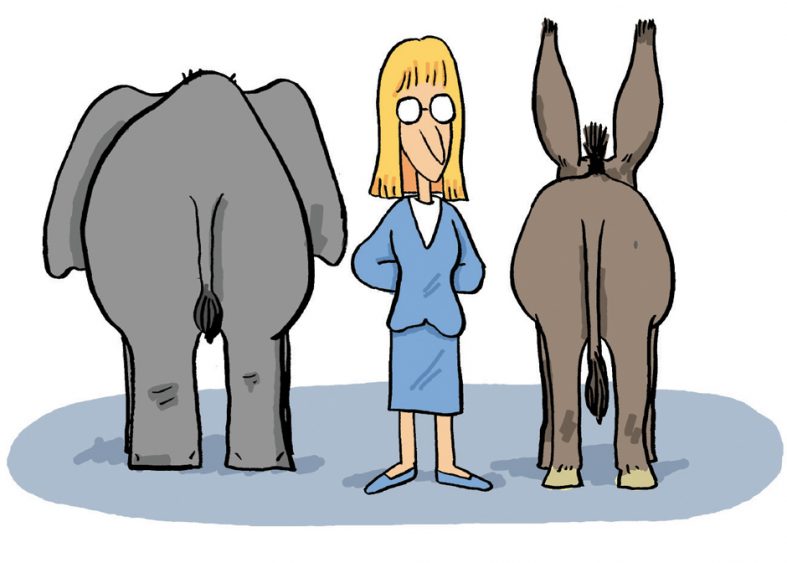By Alice Rosenblatt
It’s still a long time until the November 2020 elections, and we can expect a lot of political news before we reach the day itself. Health care, pensions, social insurance programs, and other issues of interest to actuaries will be discussed by politicians and reported on by the media. Politicians and pundits alike will be advocating for certain positions, and the public will often draw their own desired—but erroneous—conclusions based on these statements.
Actuaries often express their opinions on these issues by working on task forces and other groups supported by the American Academy of Actuaries. In these instances, the profession is helping to educate the public on an issue. And the Academy is fulfilling its mission, as the mission includes: “As the public voice for the United States actuarial profession, the Academy provides independent and objective actuarial information, analysis, and education for the formation of sound public policy.”
Shawna Ackerman recently stated in a President’s Message on the topic of “Respecting Differences and Independence”—“We reach out to policymakers with objective and independent actuarial input because that is an essential part of the Academy’s mission to serve the public. Put differently, we choose not to advocate in the policymaking process because we believe that an independent and objective voice is the most effective voice given the complexity in which we operate.”
However, some actuaries may wish to advocate for a particular position, and may want to write letters to editors of newspapers or express ideas in other ways, such as blogs. Can this be done without violating the Code of Professional Conduct (Code)?
The answer is “yes” … but one should exercise some caution. Assuming the actuary is identifying himself or herself as an actuary, or using credentials after the name after checking Precept 12, one could say or include in the written document a statement such as “This represents my opinion, and not that of any actuarial organization or my employer.” Precept 12 provides that you can only use membership titles and designations in a manner that conforms to the practices authorized by that organization. The Academy’s policy can be found at actuary.org/titles.
But the real question is whether your opinion is a Statement of Actuarial Opinion (SAO).
A useful document for determining what is and what is not an SAO is the Qualification Standards for Actuaries Issuing Statements of Actuarial Opinion in the United States (USQS) which were effective January 1, 2008. Appendix 1 of this document, titled “Examples of Actuarial Opinion” provides some guidelines on this subject. Specifically, Section 1.d. states: “Not every communication by an actuary is an SAO. The communication must be based on actuarial considerations.” Section 1.e. adds: “A statement that contains data and/or other information but does not contain actuarial advice or an actuarial opinion is not an SAO.” Appendix 1, Section II provides a list of Actuarial Opinions and Work Products in table format. Section E of this table includes examples of communications that are not SAOs. Specifically included in Section E are letters to the editor and interviews by media.
So, what if Actuary A disagrees with the opinion expressed in a letter to the editor by Actuary B? Actuary A could get in touch with Actuary B and explain the rationale for the disagreement. Actuary A could also write a letter to the editor of the same publication and discuss the issue from a different viewpoint. This situation would be no different than two non-actuaries who had a difference of opinion on a particular subject.
But what if Actuary A believes that Actuary B has written something very misleading to the public? Is that a violation of Precept 1 of the Code? Precept 1 states: “An Actuary shall act honestly, with integrity and competence, and in a manner to fulfill the profession’s responsibility to the public and to uphold the reputation of the actuarial profession.” Annotation 1-1 states: “An Actuary shall perform Actuarial Services with skill and care.” The Code defines Actuarial Services as “Professional services provided to a Principal by an individual acting in the capacity of an actuary. Such services include the rendering of advice, recommendations, findings, or opinions based upon actuarial considerations.” Then the question becomes: Is this opinion piece based on actuarial considerations? Let’s say the opinion piece states that health care cost trends for the privately insured have been running around 4% (based on a Health Care Cost Institute report for 2017). That statement is not based on actuarial considerations. However, if the opinion piece states that health care cost trends are expected to remain at about 4% for the next few years, that statement is based on actuarial considerations. Thus, if what Actuary B has written is based on actuarial considerations, and Actuary A thinks that the piece damages the reputation of the actuarial profession, Actuary A would need to follow Precept 13, which states: “An Actuary with knowledge of an apparent, unresolved material violation of the Code by another Actuary should consider discussing the situation with the other Actuary and attempt to resolve the apparent violation.” Annotation 13-1 further states: “A violation of the Code is deemed to be material if it is important or affects the outcome of a situation, as opposed to a violation that is trivial, does not affect an outcome or is one merely of form.”
Are there instances where public statements could violate the Code?
What if an actuary expressed disparaging remarks using social media (such as Facebook or Twitter)? Would those be “public statements”? If so, the actuary might be violating Precept 1 of the Code—specifically Annotation 1-4, which states: “An Actuary shall not engage in any professional conduct involving dishonesty, fraud, deceit, or misrepresentation or commit any act that reflects adversely on the actuarial profession.” (Emphasis added.) Note that the acts in the highlighted wording are not limited to professional actions. In fact, if you peruse the public discipline notices on the Academy website you will find actuaries disciplined for sexual harassment, tax fraud, and insider trading, none of which are actuarial in nature.
Thus, an actuary can certainly express an opinion, but should do so with care and awareness of the Code of Professional Conduct and the implications for the reputation of the actuarial profession.
ALICE ROSENBLATT, MAAA, FSA, CERA, is a member of the Actuarial Board for Counseling and Discipline.





